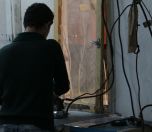Photo: Hikmet Adal / bianet
Click to read the article in Turkish
Eighty-three out of 100 refugee workers interviewed by a workers' association stated that they have lost their jobs during the coronavirus pandemic.
There are a total of 5,67 million refugees and migrants in Turkey and 71.4 percent of them are at working age, according to the United Nations Department of Economic and Social Affairs (UN DESA).
As well as losing their jobs, refugee workers were also not able to benefit from social assistance provided to the people who lost their jobs during the pandemic as most refugee workers work unregistered, the report by the Leather, Textile and Shoe Workers' Association pointed out.
A limited number of refugees have been able to access the aid provided by municipalities and VEFA Social Assistance Groups affiliated with the Ministry of Interior.
Here are the findings of the survey among the workers:
- Out of 100 workers, 37 worked at textile and shoe workshops, 13 at industrial workshops, 15 at factories, eight at the service sector, six at recycling work and 21 at construction sites.
- While most of the workers were from Syria, there were also ones from Iran, Iraq and Afghanistan among them.
- Only five of the workers were registered.
- 32 of the interviewed workers were women and 68 were men.
- 83 workers said they lost their jobs or were put on unpaid leave in March following the start of the outbreak in Turkey. Eight said they continued working and nine said they continued working part-time.
- Out of the 83 workers who lost their jobs, 71 said they had been unemployed for six months, eight said they had been unemployed for five months and four said they had been unemployed for four months.
- Only four workers said their income didn't decrease during the pandemic time. Thirteen said their income decreased, 83 said they totally lost their income.
- Only 23 workers said they benefited from food and cleaning supplies provided by local governments or humanitarian associations.
- Eighty-one refugees said they had problems paying their rents, 91 said they had problems meeting their food needs, 77 percent said they had problems paying their bills.
What do workers say?
Muhammed, a recycling worker, said, "We were completely forgotten in the pandemic time. We were presented with two options: Starving to death or getting a disease. We sometimes encounter waste masks and gloves but we will continue to earn our bread from garbage, taking the risk of catching corona."
Halil, a textile worker, said, "In the pandemic time, I had been unemployed for five months and this time passed like a fight for our lives. Now we are trying to recover but this will also take a long time. We are indebted to the landlord and the grocery shop. I have to work overtime to pay the debt but there is not much work yet."
Leyla, another textile worker, said that her employer dismissed women workers first during the pandemic, while men continued to work part-time. (HA/VK)









